Dietetics:NutritionMoments
What are "Nutrition Moments"?
"Nutrition Moments" are the results of a collaboration between the BC Brain Wellness Program and UBC Dietetics. Throughout March 2024, small groups of dietetics students will share key nutrition information and actionable tips during online and in-person exercise classes.
Nutrition Moment #1: Polyphenolic Compounds & Alzheimer’s Disease

Developed and Delivered by Aubrey Lee, Narges Bouzari, & Stefanija Rekasius
Brain Wellness Program Class and Date
March 8th 10:30am High Intensity Chair Class
Why polyphenolic compounds matters for healthy aging and brain wellness?
- Polyphenols are compounds with anti-oxidant and anti-inflammatory properties.
- Research suggests that these chemicals may preserve brain function and slow the progression of neurological decline in AD.
Participant Handout
[add pdf]
Resources for Further Learning
- https://www.nia.nih.gov/health/alzheimers-causes-and-risk-factors/what-happens-brain-alzheimers-disease
- https://www.alz.org/alzheimers-dementia/what-is-alzheimers
References
Stefaniak, O., Dobrzyńska, M., Drzymała-Czyż, S., & Przysławski, J. (2022). Diet in the Prevention of Alzheimer's Disease: Current Knowledge and Future Research Requirements. Nutrients, 14(21), 4564. https://doi.org/10.3390/nu14214564
Bukhari S. N. A. (2022). Dietary Polyphenols as Therapeutic Intervention for Alzheimer's Disease: A Mechanistic Insight. Antioxidants (Basel, Switzerland), 11(3), 554. https://doi.org/10.3390/antiox11030554
Colizzi C. (2018). The protective effects of polyphenols on Alzheimer's disease: A systematic review. Alzheimer's & dementia (New York, N. Y.), 5, 184–196. https://doi.org/10.1016/j.trci.2018.09.002
https://www.frontiersin.org/articles/10.3389/fnagi.2022.1019942/full
Singh, N., & Yadav, S. S. (2022). A review on health benefits of phenolics derived from dietary spices. Current research in food science, 5, 1508–1523. https://doi.org/10.1016/j.crfs.2022.09.009
Bolling, B. W., McKay, D. L., & Blumberg, J. B. (2010). The phytochemical composition and antioxidant actions of tree nuts. Asia Pacific journal of clinical nutrition, 19(1), 117–123. https://www.ncbi.nlm.nih.gov/pmc/articles/PMC5012104/
Dabeek, W. M., & Marra, M. V. (2019). Dietary Quercetin and Kaempferol: Bioavailability and Potential Cardiovascular-Related Bioactivity in Humans. Nutrients, 11(10), 2288. https://doi.org/10.3390/nu11102288
Kaplan, A., Zelicha, H., Yaskolka Meir, A., Rinott, E., Tsaban, G., Levakov, G., Prager, O., Salti, M., Yovell, Y., Ofer, J., Huhn, S., Beyer, F., Witte, V., Villringer, A., Meiran, N., B Emesh, T., Kovacs, P., von Bergen, M., Ceglarek, U., Blüher, M., … Shai, I. (2022). The effect of a high-polyphenol Mediterranean diet (Green-MED) combined with physical activity on age-related brain atrophy: the Dietary Intervention Randomized Controlled Trial Polyphenols Unprocessed Study (DIRECT PLUS). The American journal of clinical nutrition, 115(5), 1270–1281. https://doi.org/10.1093/ajcn/nqac001
Nutrition Moment #2: Vitamin D and Stroke Rehabilitation
Developed and Delivered by Kelly Chia, Glorianna Chui and Sarah Schneidereit
Brain Wellness Program Class and Date
March 11th, 1PM FAME Class

Why Vitamin D matters for healthy aging and brain wellness?
- Vitamin D is important for bone remodelling, which can help prevent osteoporosis and increase calcium absorption.
- Vitamin D supports the development of the neurological system and may also help with stroke recovery. [1]
Participant Handout
[add pdf]
Resources for Further Learning
References
Fleet JL, McIntyre A, Janzen S, et al. A systematic review examining the effect of vitamin D supplementation on functional outcomes post-stroke. Clinical Rehabilitation. 2023;37(11):1451-1466. doi:10.1177/02692155231174599
Marek, K., Cichoń, N., Saluk-Bijak, J., Bijak, M., & Miller, E. (2022). The Role of Vitamin D in Stroke Prevention and the Effects of Its Supplementation for Post-Stroke Rehabilitation: A Narrative Review. Nutrients, 14(13), 2761. https://doi.org/10.3390/nu14132761
Narasimhan, S., & Balasubramanian, P. (2017). Role of Vitamin D in the Outcome of Ischemic Stroke- A Randomized Controlled Trial. Journal of clinical and diagnostic research : JCDR, 11(2), CC06–CC10. https://doi.org/10.7860/JCDR/2017/24299.9346
Vitamin D. (2023, September 28). Office of Dietary Supplements (ODS). https://ods.od.nih.gov/factsheets/VitaminD-HealthProfessional/
Nutrition Moment #3: Protein Digestion & Absorption

Developed and Delivered by Lea Holdo, Matthew Riccardi, Jasmine Zhao
Brain Wellness Program Class and Date
Functional Strength, March 14th at 9:30AM
Why enhancing protein absorption matters for healthy aging and brain wellness?
Protein functions as the building blocks for muscles. One of the goals of the functional strength program at BC Brain Wellness is to promote muscle strength, tone and growth. Therefore, we want to ensure that not only is everyone eating enough protein, but they are absorbing as much as possible. Proper protein absorption has been linked to self-sufficiency and independent living, which can help enhance quality of life for older adults.[2]
Participant Handout
[add pdf]
Resources for Further Learning
- https://acl.gov/sites/default/files/nutrition/Nutrition-Needs_Protein_FINAL-2.18.20_508.pdf
- https://food-guide.canada.ca/en/healthy-eating-recommendations/make-it-a-habit-to-eat-vegetables-fruit-whole-grains-and-protein-foods/eat-protein-foods/
References
Nutrition Moment #4: Fibre for Health
Developed and Delivered by Areej Altaf, Jordan Amantea, and Dahlia Parolin

Brain Wellness Program Class and Date
Wed Mar 13th 10am - LIIT (Online)
Why does fibre matter for healthy aging and brain wellness?
- Adequate fibre intake helps promote bowel regularity, maintain lower blood cholesterol levels, and keep you fuller for longer
- Consuming fibre from a variety of plant foods helps to support a healthy gut microbiome, which emerging research shows may be associated with improved cognition and healthy aging
- The median fibre intake of Canadians falls below Health Canada recommendations, so most people would benefit from adding more fibre to their diet
Participant Handout
Resources for Further Learning
- Health Canada, 2019
- Facts on Soluble Fibre, Dietitians of Canada, 2018
- Getting More Fibre, Dietitians of Canada, 2019
References
Nutrition Moment 5: Pre & Post Nutrition for a HIIT Workout
Developed and Delivered by Caitlin Jacob, Nadia Snyman, Olivia Dodsworth

Brain Wellness Program Class and Date
HIIT (ONLINE) March 15th 9:30 am
Why Pre & Post Workout Nutrition matters for healthy aging and brain wellness?
Adequate nutrition for pre and post HIIT workout is crucial for several reasons. Prior to a workout, nutrition provides the necessary energy to fuel your body, achieve optimal performance, and prevent injury. Post-workout nutrition is essential for replenishing your body’s energy stores and supporting recovery. [3]
Participant Handout
[add pdf]
Resources for Further Learning
- Canada's Food Guide: Healthy Eating for Seniors, Government of Canada, 2022
- Nutrition and Athletic Performance, Dietitians of Canada, 2016
- Pre Workout and Post Workout Meals for Endurance and Strength Training, Abbey Sharp, 2020
References
Semeco, A. (2023, March 14). Post-workout nutrition. Healthline. https://www.healthline.com/nutrition/eat-after-workout
Timing your pre and Post Workout Nutrition. Timing Your Pre and Post Workout Nutrition. (n.d.). https://www.eatright.org/fitness/physical-activity/exercise-nutrition/timing-your-pre-and-post-workout-nutrition
Nutrition Moment #6: Fluid Is Your Friend! Guidelines and Tips on How to Meet Your Hydration Needs
Developed and Delivered by Isabelle Cortejos-Noble, Maja Kostanski & Carly Watkins
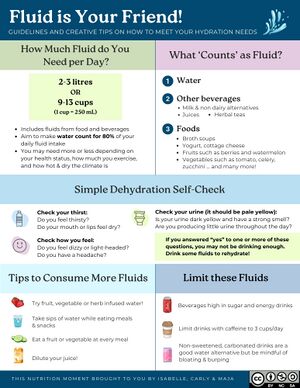
Brain Wellness Program Class and Date
Monday, March 18th @ 2 pm – Chair Fit Class (online)
Why adequate hydration matters for healthy aging and brain wellness?
Water is an essential nutrient that is often overlooked. Dehydration is common in older adults therefore it is important to be reminded about daily fluid intake recommendations along with helpful tips on how to meet those recommendations. [4]
Participant Handout
File:Fluid is Your Friend Handout.pdf
Resources for Further Learning
- Drinking enough water, HealthLinkBC, n.d.
- Resources for older adults, Older Adult Nutrition Screening, n.d.
References
Barry M Popkin, Kristen E D'Anci, Irwin H Rosenberg, Water, hydration, and health, Nutrition Reviews, Volume 68, Issue 8, 1 August 2010, Pages 439–458, https://doi.org/10.1111/j.1753-4887.2010.00304.x
HealthLinkBC. (n.d.). Drinking enough water. Retrieved from: https://www.healthlinkbc.ca/healthy-eating-physical-activity/food-and-nutrition/eating-habits/drinking-enough-water
National Defence Department. (2021, August 8). Health promotion - facts on fluids: How to stay hydrated. Retrieved from: https://www.canada.ca/en/department-national-defence/corporate/news/regional-news/western-sentinel/2021/08/facts-on-fluids-how-to-stay-hydrated.html
Older Nutrition Screening. (n.d). Resources for older adults. Retrieved from: https://olderadultnutritionscreening.com/resources-for-older-adults/#staying-hydrated
Water. The Nutrition Source. (2021, July 6). Retrieved from: https://www.hsph.harvard.edu/nutritionsource/water/
Nutrition Moment 8: Hydration, Protein & Workout Foods
Developed and Delivered by Deirdre Neumann, Maria Serban, Clare Douglas, Connie Zhou
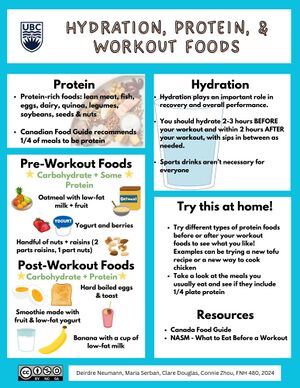
Brain Wellness Program Class and Date
Strength & Balance Class (Online) | Thursday, March 21, 2024
Why Hydration, Protein & Workout Foods matters for healthy aging and brain wellness?
Continue hydrating as you age, as it is important for recovery and overall performance during exercise[5]. Pre-workout- and post-workout nutrition matter for healthy aging and brain wellness to replenish energy and maintain health after exercise[6].
Protein: As individuals age, there is a decrease in muscle mass[7]. One way to address muscle wasting is to consume adequate protein as dietary protein intake is directly correlated with lean body mass in older adults[8].
Carbohydrates: Carbohydrates provide a quick energy source to fuel our muscles and brain[9].
Participant Handout
[add pdf]
Resources for Further Learning
- Eat Protein Foods, Government of Canada, 2022
- Sports Nutrition: Facts on Vitamins and Minerals, UnlockFood, 2019
Nutrition Moment #9: Mindful Eating
Developed and Delivered by Madison Kaminski, Bernice Hong, and Mila Fraser
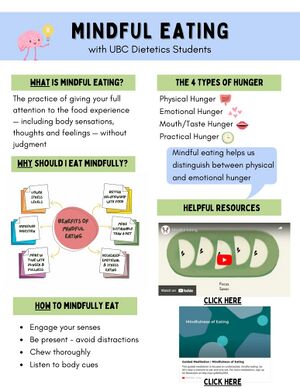
Brain Wellness Program Class and Date
Thursday, March 21st at 4pm
Why Mindful Eating matters for healthy aging and brain wellness?
Mindful eating matters for healthy aging and brain wellness because:
- Nutrient Digestion/Absorption: Mindful eating encourages slower consumption, allowing for better digestion and absorption of nutrients essential for brain health.
- Reduced Stress: Mindful eating practices lower stress levels, which can otherwise contribute to inflammation and cognitive impairment.
- Better Food Choices: Mindful eating promotes awareness of food choices, leading to a balanced diet rich in antioxidants and other nutrients crucial for brain health.
- Enhanced Satiety: Being mindful during meals increases awareness of satiety cues, reducing the likelihood of unnecessary snacking and supporting weight management.
Participant Handout
[add pdf]
Resources for Further Learning
References
https://www.ncbi.nlm.nih.gov/pmc/articles/PMC3004979/
https://www.ncbi.nlm.nih.gov/pmc/articles/PMC10100015/
Nutrition Moment #10: Pre/Post Exercise Nutrition
Developed and Delivered by Sam, Joseph, Amy
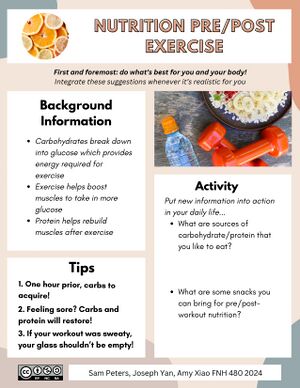
Brain Wellness Program Class and Date
FAME - Monday March 25th at 2pm
Why pre/post-exercise nutrition matters for healthy aging and brain wellness?
Adequate nutrition is critical in supporting exercise performance, and therefore maintenance of lean muscle mass over time. Maintaining muscle mass into older adulthood allows for greater strength and mobility for a longer period of time, and supports healthy aging (HealthlinkBC, n.d). Maintaining a good level of activity can help improve independence, management of day-to-day tasks, and improve quality of life. Proper pre and post-exercise nutrition helps provide energy through appropriate carbohydrate intake to support achievement of fitness and exercise goals, and also supports maintenance and improvements of lean mass through appropriate and adequate protein intake post-workout.
Participant Handout
[add pdf]
Resources for Further Learning
- Timing your pre and post-workout nutrition, Christopher R Mohr, 2019
- Canada's Food Guide, Government of Canada, 2024
References
- Aragon AA, Schoenfeld BJ. Nutrient timing revisited: is there a post-exercise anabolic window? J Int Soc Sports Nutr. 2013 Jan 29;10(1):5. doi: 10.1186/1550-2783-10-5.
- Ivy JL, Katz AL, Cutler CL, Sherman WM, Coyle EF. Muscle glycogen synthesis after exercise: effect of time of carbohydrate ingestion. J Appl Physiol (1985). 1988 Apr;64(4):1480-5. doi: 10.1152/jappl.1988.64.4.1480. PMID: 3132449.
- Volpi, E., Nazemi, R., & Fujita, S. (2004). Muscle tissue changes with aging. Current opinion in clinical nutrition and metabolic care, 7(4), 405–410. https://doi.org/10.1097/01.mco.0000134362.76653.b2
- Physical Activity for Older Adults | HealthLink BC. (n.d.). https://www.healthlinkbc.ca/healthy-eating-physical-activity/age-and-stage/older-adults/physical-activity
Nutrition Moment 11: Bone Health
Developed and Delivered by Kristen Chan, Emily Lam, Esther Oortgiesen

Brain Wellness Program Class and Date
Virtual Chair Yoga. March 27 @ 2:00 pm
Why [Bone Health] matters for healthy aging and brain wellness?
[Bone health is incredibly important for healthy aging, especially for certain populations who are at risk for the development of oseoporosis. Bones play an important role in the body of providing structure, serving as a place for muscles to attach, protecting our internal organs, and storing calcium and other minerals. As we age, bone breaks down faster than it is built and we can become at risk for bone fractures and falls. Osteoporosis is a disease characterized by low bone mass and deterioration of bone tissue, which is most prevalent in older aduls. One of the best ways we can prevent osteoporosis from developing is through nutrition! In this workshop, we will be focusing on the roles of calcium and vitamin D and how to improve inake for each nutrient. [10] [11]
Participant Handout
[add pdf]
Resources for Further Learning
- Osteoporosis Nutrition, Osteoporosis Canada, 2024
- Nutrition and Healthy Bones, BC Government, 2017
- Bone Health, UnlockFood, 2024
Nutrition Moment #12: Strategies To Incorporate High-Protein Foods
Developed and Delivered by Maggie Ching, Marika Neville & Celina So
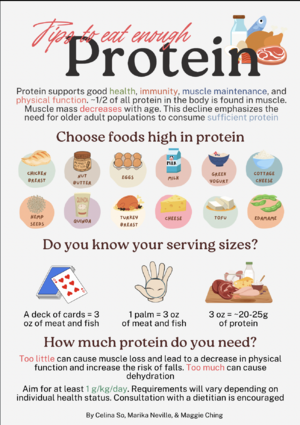
Brain Wellness Program Class and Date
Strength & Balance Level 3 (online) | March 26 @ 4:30pm
Why Strategies To Incorporate High-Protein Food matters for healthy aging and brain wellness?
As we age, our protein needs evolve, reflecting the changes in our bodies and health. Older adults, in particular, face increased risks of muscle mass loss, low bone density, and a host of other health concerns that can impact quality of life and independence. Among these concerns, sarcopenia stands out. Sarcopenia is defined as the progressive loss of muscle mass and strength, which poses a significant risk to the elderly, affecting their mobility, balance, and overall health status.
For older adults, consuming enough protein can help mitigate the effects of sarcopenia, support recovery from illness or surgery, and maintain a healthy immune system. Therefore, it is crucial to understand the importance of adequate protein intake.
Participant Handout
[add pdf]
Resources for Further Learning
- Estimate Portion Sizes Using Your Hands, Southern Illinois University Edwardsville, N/D
- Nutrition Needs for Older Adults: Protein, The National Resource Center on Nutrition & Aging, 2020
- https://www.albertahealthservices.ca/assets/info/nutrition/if-nfs-adding-protein-to-your-diet.pdf / Adding Protein to Your Diet, Alberta Health Services, 2023]
References
Bauer, J., Biolo, G., Cederholm, T., Cesari, M., Cruz-Jentoft, A. J., Morley, J. E., ... & Boirie, Y. (2013). Evidence-based recommendations for optimal dietary protein intake in older people: a position paper from the PROT-AGE Study Group. Journal of the american Medical Directors association, 14(8), 542-559. https://doi.org/10.1016/j.jamda.2013.05.021
Bradlee, M. L., Mustafa, J., Singer, M. R., & Moore, L. L. (2018). High-protein foods and physical activity protect against age-related muscle loss and functional decline. The Journals of Gerontology: Series A, 73(1), 88-94. https://doi.org/10.1093/gerona/glx070
Larsson, L., Degens, H., Li, M., Salviati, L., Lee, Y. I., Thompson, W., ... & Sandri, M. (2019). Sarcopenia: aging-related loss of muscle mass and function. Physiological reviews, 99(1), 427-511. https://doi.org/10.1152/physrev.00061.2017
LeWine, H. E. (2023). How much protein do you need every day?. Harvard Health Publishing. https://www.health.harvard.edu/blog/how-much-protein-do-you-need-every-day-201506188096
Instructions for Students
After you have edited your entry from the template posted on Canvas...
- Login to the UBC Wiki, using your CWL ID and Password
- Select “Wikitext” to begin editing (located on the right side of the editing panel) – Ensure no one else is currently editing the page!
- Paste your text into the Wiki page arranged by group number (1, 2, 3, etc…)
- Switch to regular “Edit” mode to insert your citations and any additional weblinks
- Insert your handout as both a jpeg and a pdf file in the appropriate section of your entry using the Special:UploadWizard
- Once everything looks right, Save changes.
Template Nutrition Moment #100: Sample Title
Developed and Delivered by {student names}
Brain Wellness Program Class and Date
{add details here}
Why {your topic} matters for healthy aging and brain wellness?
Add your rationale here, which should include a citation of at least one reliable external reference, for example [12] This section would include any peer-reviewed articles that are important in your session creation (rather than in the Resources for Further Learning section below).
Participant Handout
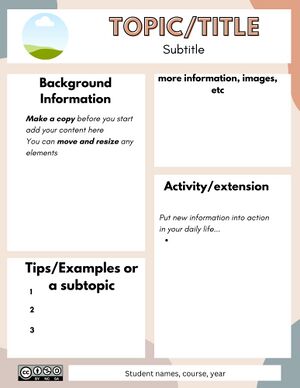
{upload as jpeg and pdf using the Special:UploadWizard - Don't forget to give your handout a nice title and include the appropriate Creative Commons license graphic}
Resources for Further Learning
Include 1-3 evidence-based resources that are appropriate to the target audience, where they can learn more about your topic or how to apply this learning to their lives. Government-run websites, non-profit organizations, and dietitian or other nutrition/food blogs are all appropriate here.
- Resource 1 title, author, year
- Resource 2 title, author, year
- [https: Resource URL/ Resource 3 title, author, year]
References
- ↑ "Role of Vitamin D in the Outcome of Ischemic Stroke- A Randomized Controlled Trial". PubMed Central. February 1, 2017. Retrieved February 24, 2024.
|first=missing|last=(help) - ↑ Lee, S. Y.; Kang, J. H.; Lee, D. Y.; Jeong, J. W.; Kim, J. H.; Moon, S. S.; Hur, S. J. (2023). "Methods for improving meat protein digestibility in older adults". Journal of Animal Science and Technology. 65: 32–56.
- ↑ "Timing your Pre-and Post- Workout Nutrition". EatRight.Org. 2024. Retrieved March 14, 2024.
|first=missing|last=(help) - ↑ Bruno, C.; Collier, A.; Holyday, M.; Lambert, K... (2021). "Interventions to Improve Hydration in Older Adults: A Systematic Review and Meta-Analysis". Nutrients. 13: 10.
- ↑ Unlock Food (January 30 2019). "Sports Nutrition: Facts on Hydration". Unlock Food. Retrieved March 20 2024. Check date values in:
|access-date=, |date=(help) - ↑ Unlock Food (February 6 2023). "Sports Nutrition: How Much Carbohydrate, Fat and Protein Do I Need?". Unlock Food. Retrieved March 20 2024. Check date values in:
|access-date=, |date=(help) - ↑ Siparsky, Patrick N; Kirkendall, Donald T; Garrett, William E (August 30 2013). "Muscle Changes in Aging: Understanding Sarcopenia". Sage Journals. Volume 6. Check date values in:
|date=(help) - ↑ Geirsdottir, Olof G; Arnarson, Atli; Ramel, Alfons; Jonsson, Palmi V; Thorsdottir, Inga (June 27 2013). "Dietary protein intake is associated with lean body mass in community-dwelling older adults". PubMed – via National Library of Medicine. Check date values in:
|date=(help) - ↑ Unlock Food (February 7 2019). "What You Need to Know About Sugar". Unlock Food. Retrieved March 20 2024. Check date values in:
|access-date=, |date=(help) - ↑ Template:Cite Web
- ↑ "Bone Health and Osteoporosis: Summary of Recommendations and Evidence". PEN. July 4 2023. Retrieved February 2, 2024.
|first=missing|last=(help); Check date values in:|date=(help) - ↑ "Finding Reliable Healthy Eating Information on the Internet". HealthLinkBC. January 26, 2019. Retrieved January 5, 2024.
|first=missing|last=(help)